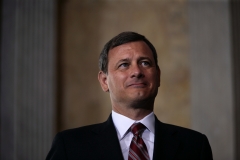
United States Chief Justice John Roberts waits to administers the oath of office for the new Treasury Secretary Henry Paulson at the U.S. Treasury Building, July 10, 2006. (Photo credit: Brooks Kraft LLC/Corbis via Getty Images)
Since providing the fifth vote to strike down the Louisiana abortion law in June, Chief Justice John Roberts has taken some criticism from pro-life and conservative leaders, including Vice President Mike Pence.
However, early media reports of the Supreme Court’s decision in the Louisiana abortion case (June Medical Services v. Russo) were incomplete. They highlighted the fact that the chief justice provided the fifth vote to strike down Louisiana’s health and safety regulations for abortion clinics, but failed to capture the implications of Roberts’ opinion.
The starting place for understanding June Medical is that it was although it was a 5-4 decision, it has played out as a 4-1-4 decision, with the chief justice in the middle. While Roberts cast the fifth vote to strike down the Louisiana law, he did not join Justice Breyer’s plurality opinion for four justices or its reasoning. Breyer’s opinion therefore is a dead letter and not binding in future cases (unless, possibly, a case in another state involves an identical law requiring “admitting privileges”).
Roberts wrote separately, alone, to say that he felt compelled to apply the Court’s 2016 decision (Whole Woman’s Health), invalidating a similar law from Texas, to invalidate the Louisiana law because he found the facts and laws in both cases to be nearly identical.
But he then quickly turned to announce that he would apply more lenient, deferential standards from the Court’s 1992 decision in Planned Parenthood v. Casey in future abortion cases. With this statement, Roberts effectively joined with the four dissenters in June Medical, Justices Thomas, Alito, Gorsuch, and Kavanaugh to change, once again, the legal standard for reviewing state abortion limits, as Justice Kavanaugh pointed out. Thus, a new majority had formed on the Court.
As a lawyer for the Center for Reproductive Rights wrote, “Roberts took pains to write an opinion that cabins the plurality. It is a concurrence that goes out of its way to find common ground with the dissenters, including disdain for the Supreme Court’s most recent precedent….In his concurrence, Roberts plants a flag to mark the battlegrounds for future abortion fights.”
The rest of the story has played out quickly in action by the Supreme Court and in lower courts in other abortion cases since June 29.
On July 2, the Supreme Court reversed two abortion-rights rulings involving Indiana abortion laws and sent the cases back to the lower courts with directions to reconsider in light of June Medical.
The impact was also felt in American College of Obstetrician and Gynecologists v. FDA, in which the FDA is defending its “in-person” requirement for the administration of the chemical abortifacient known as RU486 or mifepristone. The FDA lawyers told a federal court in Maryland that ACOG cannot claim to represent the interests of women in court and that the district court’s decision enjoining the FDA limits cannot stand under the Casey standards reinstated by the majority in June Medical.
On July 29, a “cumulative” challenge to several other Louisiana abortion laws was voluntarily dismissed, apparently due in part to the implications of June Medical.
The ripples continued to be felt on Aug. 7, when a federal appeals court in Hopkins v. Jegley vacated a three-year-old injunction against four Arkansas abortions limits passed in 2017. The lower court in Arkansas had issued the injunction after applying the Court’s 2016 decision in Whole Woman’s Health. A three-judge panel of the Eighth Circuit closely applied Roberts’ opinion in June Medical and vacated the preliminary injunction and sent it back to the lower court for “reconsideration in light of Chief Justice Roberts’s separate opinion in June Medical, which is controlling, as well as the Supreme Court’s [2019] decision in Box v. Planned Parenthood of Ind. & Ky., Inc….”
After the Eighth Circuit’s decision, abortion-rights advocates in Slate wrote: “The appellate court’s decision confirms that Chief Justice John Roberts’ controlling opinion in June Medical will serve as a tool to eviscerate abortion rights.”
Recently, Planned Parenthood dropped its lawsuit against the Indiana ultrasound-informed-consent law which the Supreme Court sent back to the lower court on July 2.
Most importantly, Roberts’ opinion, along with that of the four dissenters, has served to keep Roe unsettled by, once again, changing the legal standard by which state abortion limits are judged.
From Roe to Webster to Casey to Stenberg to Gonzales to Whole Woman’s Health to June Medical, the applicable legal standards in abortion cases have constantly changed.
Political commentators casually refer to stare decisis as a shorthand for sticking to any past decision. But the complete legal maxim stare decisis et non quieta movere means “to stand by or adhere to decisions and not disturb that which is settled.” The settled factor is the hinge of stare decisis. If a precedent is unsettled, stare decisis respect doesn’t apply. If a precedent is settled, a good reason should be found before abandoning it. Clearly, Roe is unsettled.
The full story will continue to play out for months to come in the approximately 60 abortion cases, from many states, that are in the federal court pipeline. As the Eighth Circuit did in Hopkins, numerous abortion decisions by lower courts may need to be reexamined. Injunctions in some cases may be lifted and the state abortion limits allowed to go into effect. And Planned Parenthood may cave, as it did in the Indiana case. But the unsettled abortion issue is sure to come back to the Court sooner rather than later.
Clarke D. Forsythe is a senior counsel at Americans United for Life.


